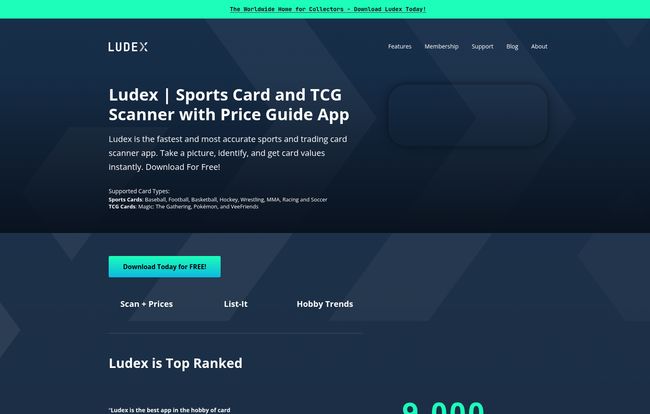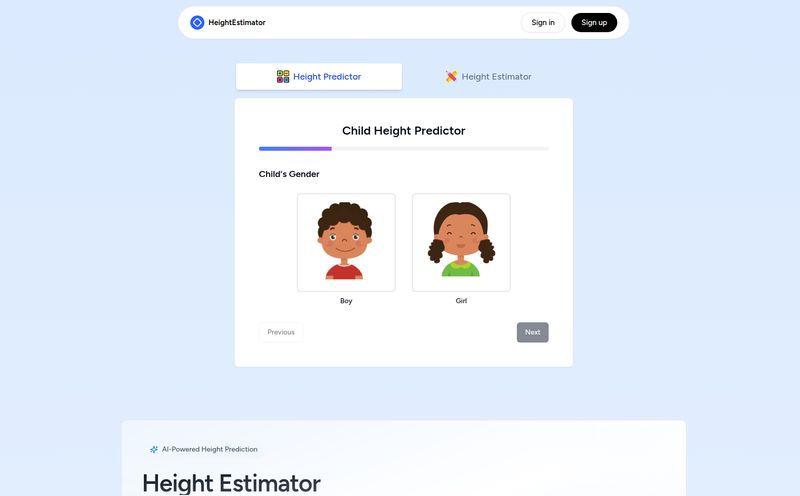If you've been in the sports card or TCG hobby for more than five minutes, you have a pile. You know the one. The “I’ll sort this later” pile. The shoebox under the bed. The stack of toploaders on your desk that’s starting to look like a tiny, precarious skyscraper.
For years, managing a collection meant tedious hours with spreadsheets, endless eBay searches for comps, and a whole lot of guesswork. It was a chore. A necessary evil on the path to enjoying the hobby. I’ve been there, hunched over a laptop at 1 AM trying to figure out if that '93 Finest Refractor is the real deal or just a base card catching the light weird. It’s part of the grind, but what if it didn't have to be?
Recently, I've been hearing a lot of buzz about an app called Ludex. The promise is simple: scan your cards, get instant values, and manage your entire collection from your phone. It sounds like a dream, right? Almost too good to be true. So, as your resident SEO guy and lifelong collector, I had to see for myself. I downloaded it, fed it a stack of my own cards, and I’m here to report back.
So, What is Ludex Anyway?
In a nutshell, Ludex is a mobile app designed to be the Swiss Army knife for the modern card collector. It combines a high-speed card scanner with a real-time price guide and collection management tools. Think of it as Shazam, but for your cardboard. Instead of identifying a song, it identifies your card—the player, the year, the set, the parallel—and instantly tells you what it’s worth based on recent sales from major marketplaces.
It covers a pretty wide spectrum of hobbies, including Baseball, Basketball, Football, Hockey, Wrestling, Soccer, and TCGs like Pokémon. The goal is to take the most time-consuming parts of the hobby and automate them. A bold mission, for sure.

Visit Ludex
My First Impressions: The Magic of the Scan
Okay, the scanner is the main event here. And I’ve gotta say, it’s impressive. I grabbed a random stack—a mix of modern Prizm basketball, some 90s football inserts, and a couple of base cards I couldn't be bothered to look up myself. You just place the card down, tap the screen, and zap. The app identifies it in seconds. It’s fast. Like, scary fast.
The accuracy was surprisingly solid. It correctly identified a tricky Genesis parallel of a recent NBA draft pick and even nailed a weird, unnumbered insert from the junk wax era that I forgot I even had. Of course, no tech is perfect. It had a little trouble with a couple of extremely obscure promo cards, but for 95% of what I threw at it, it was spot on. It pulls the card's details and shows you a portfolio view of its estimated value. It’s a genuinely satisfying feeling, watching a dusty pile of cards instantly turn into organized, quantifiable data.
More Than Just a Scanner: The Core Features
While the scanner gets the headlines, the other features are what make Ludex a potentially powerful tool rather than just a fun toy.
The All-Knowing Price Guide
This is the heart of the platform. Ludex pulls its pricing data from recent, verified sales across multiple online marketplaces. This is a critical point for any serious collector or flipper. Asking prices are just wishful thinking; sold comps are the ground truth. Seeing that data aggregated instantly saves an insane amount of time you’d otherwise spend toggling between eBay tabs and 130point.com. You can see the value of a single card or the total estimated value of your entire collection, which is both thrilling and slightly terrifying.
Taming the Chaos: Collection Management
Once you scan a card, you can add it to your collection, or 'Portfolio' as they call it. This creates a digital version of your binder. You can sort by sport, player, value, or whatever you like. For me, this is a massive improvement over my old, clunky spreadsheet. Seeing your collection’s value fluctuate with the market is a powerful feature, especially if you view your cards as an alternative asset class, which many of us started doing during the big hobby boom a few years back.
From Binder to Buyer: The eBay Listing Tool
This is a big one for anyone looking to sell. With the paid plans, Ludex can auto-populate an eBay listing for you. It pulls the card details, suggests a title, and gets the draft ready to go. This drastically cuts down on the friction of selling. Now, here's the catch: as of now, this feature is only available in the US. It's a bit of a bummer for my international friends, but for US-based sellers, it’s a potential game-changer. I imagine this could be a massive time-saver for someone running a high-volume eBay store.
The Good and The Not-So-Good
No tool is perfect, and it’s important to have a balanced view. The speed and accuracy of the scanner are definite wins. The interface is clean and easy to figure out, even for someone who isn't super tech-savvy. The price guide, drawing from real sold listings, is legitimately useful.
On the flip side, the biggest limitation is that some of the best features are locked behind a subscription. The free plan is more of a 'try before you buy' experience. The website says you get unlimited scans, but you can only add up to 60 cards to your collection. So you can identify cards all day long, but to actually manage a decent-sized collection, you'll need to open your wallet. And of course, the US-only eBay feature is a drawback for a global hobby.
The Big Question: Ludex Pricing
This is where the rubber meets the road. Ludex operates on a freemium model with several tiers. I've broken it down for you here:
| Plan | Price | Best For |
|---|---|---|
| Free | $0.00 / month | The absolute beginner or curious user. Lets you scan cards and add up to 60 to your collection. Good for getting a feel for the app. |
| Lite | $4.99 / month | The single-sport or single-TCG collector who wants unlimited portfolio management for their main hobby. |
| Standard | $9.99 / month | The serious, multi-sport collector or casual flipper. This unlocks all categories and gives you 50 eBay listings per month. For my money, this seems like the sweet spot for most dedicated hobbyists. |
| Pro | $24.99 / month | The power seller. This is for people who are running a business on eBay and need to list a high volume of cards (up to 250) quickly. |
The annual plans offer a discount, which is pretty standard stuff. The choice really depends on how deep you are in the hobby.
Who Is Ludex Really For?
After playing around with it, I think Ludex serves a few different types of people.
- The Inheritor: Someone who just found their dad's old collection in the attic and has no idea what they're looking at. The free plan is perfect for a quick, initial sort to see if there's any hidden treasure.
- The Casual Collector: The person who enjoys the hobby but doesn't have time for spreadsheets. The Lite plan is probably enough to manage their PC (personal collection) and track its value.
- The Serious Investor/Flipper: The person who is constantly buying, selling, and tracking market trends. The Standard or Pro plan is almost a necessity here, saving countless hours that can be better spent on finding the next big card.
It's a tool that scales with your commitment to the hobby, which I think is a smart approach.
Conclusion: Is Ludex a Game-Changer?
So, back to the original question. Is Ludex the magical solution to all our collecting woes? Maybe not all of them—it won't stop you from overpaying for a wax box, for example. But it is an incredibly powerful and well-designed tool that genuinely solves some of the most annoying problems in the hobby. It takes the tedious data entry and price research that used to take hours and condenses it into a few seconds of camera work.
For me, the value is clear. It brings a level of efficiency and data analysis to the hobby that was previously reserved for the most dedicated power users. It's a tool that can help you rediscover the joy in your collection by removing the drudgery. And that pile of cards on my desk? It’s finally sorted. And that, my friends, is a victory in itself.
Frequently Asked Questions
- Is the Ludex price guide reliable?
- Yes, for the most part. It bases its prices on actual sold listings from major marketplaces, which is the industry standard for valuation. However, market prices can be volatile, so it's best used as a strong, real-time estimate.
- What card games and sports does Ludex support?
- Ludex supports major US sports like Baseball, Basketball, Football, Hockey, as well as Soccer, MMA, Boxing, and Wrestling. For TCGs, it is known to support major games like Pokémon.
- Can I sell my cards directly through Ludex?
- Not directly. Ludex facilitates selling by creating pre-populated drafts for eBay. You still complete and manage the final sale on the eBay platform. This feature is currently limited to users in the United States.
- How accurate is the Ludex card scanner?
- In my experience, it's highly accurate for the vast majority of standard-issue cards, including many parallels and inserts. It might struggle with extremely rare, obscure, or custom cards, but its performance on mainstream cards is excellent.
- Is there a completely free version of Ludex?
- Yes, there is a free plan. It allows for unlimited scanning and identification, but you are limited to adding a maximum of 60 cards to your managed collection or portfolio.



